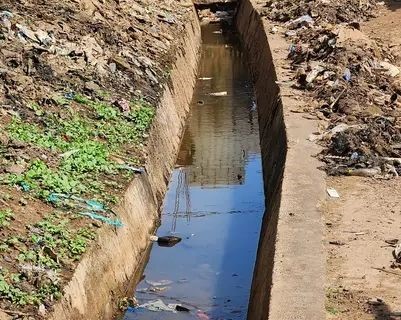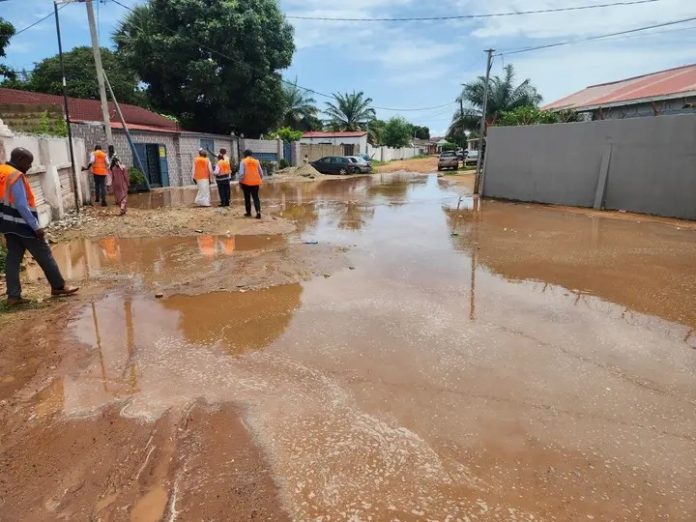Clarifies Role of Councils in Road and Drainage Management
By Nelson Manneh
The Acting Managing Director of the National Roads Authority (NRA), Mr. Sulayman Sumareh Janneh, on Wednesday 20th August 2025 granted Foroyaa an exclusive interview in which he discussed road and drainage challenges in Kanifing Municipality and parts of the West Coast Region.
Mr. Janneh explained that the NRA is responsible for all roads in The Gambia, but noted that discussions are ongoing to allow municipalities to assume responsibility for certain roads within their respective areas.
“The demarcation has not been done yet to identify those roads,” he clarified.
He said that in the area of road maintenance, there is an understanding between the municipalities and the NRA, particularly when it comes to cleaning drainage systems. Traditionally, the two institutions would jointly embark on drainage cleaning each year, but recently the NRA has taken the lead.
“It may be due to resource constraints that is why the municipalities are not participating, but we at NRA see it as a communal effort and we take the lead,” he said.
He added that from Churchills Town to Latrikunda, major blockages have prevented effective cleaning.

“Apparently there are certain areas that do have serious blockage to an extent that the cleaning crews contracted were not able to access them,” he said.
He explained that some residents have put permanent blockages in the drainage systems or have made it very difficult to clean them effectively.
According to him, some shopkeepers have even placed concrete into the drainage systems, creating permanent blockages that cleaning crews lack the equipment to remove.
“This is an attitudinal issue for the country. The people of this country need to know that when we build infrastructures they are built to serve purpose but when something happens people disregard that over their own business and this is what leads to flood,” he said.
Mr. Janneh warned that throwing trash in gutters violates the law, which sets a fine of D5,000. However, he stressed that enforcement is weak.
“It is not the NRA that creates the blockages, instead it is the public who do so, and they are the very ones who throw trash in the gutters. The law exists but it lacks enforcement and this is where the police come in. They should step in to arrest individuals and take them to court,” he remarked.
He said NRA normally cleans gutters at the beginning of the rainy season to complement the work expected of communities and municipalities.
“NRA builds roads and drainage systems but cleaning of drainages is not part of our mandate, but we step in to help because we know when it rains heavily it may cause harm,” he explained.
On the OIC roads, Mr. Janneh also spoke about the newly constructed OIC roads. He said NRA had visited some of the roads, identified issues, and made recommendations to contractors.
“Sometimes the contractors can be a little bit stubborn, sometimes they may not have the resources, sometimes it is difficult to address some of these issues during the rainy season and others are the knowhow,” he said.
“Here at NRA we have taken bold steps for the contractors to understand the issues at hand and orient them on what needs to be done,” he continued. He added that in some areas culverts or Irish crossings are unnecessary, and alternative systems such as piping could be used.
Turning to the Bundung Highway, which runs from Serrekunda to Latrikunda Sabaji, Mr. Janneh recalled the years of hardship residents faced when the road was in disrepair. Although the road has now been reconstructed, new challenges have emerged.
Vehicle owners, both private and commercial, have begun parking on the main carriageway, obstructing traffic, particularly around the Serrekunda connection.
“Enforce the laws; the police should enforce the laws. As far as the NRA is concerned we will provide the needed regulations because we are the custodians of the road corridors. Drivers are allowed to stop temporarily but not permanently or for a longer period,” he said.
He revealed that the NRA has been instructed to reignite operations to clear the roads, but this time with stricter measures.
“We will be having an enforcement unit working with the police and also towing vehicles which are apparently abandoned along the roads corridor. The main carriageways are not meant for vehicles to be packed especially within the urban areas. The enforcement unit will be starting next week,” he disclosed.
Mr. Janneh also addressed the chronic flooding in Churchills Town, where residents and drivers have long complained about water pooling in the area during heavy rains. He confirmed that water flows from multiple directions (Sobeya Junction and the Serrekunda Fire Station towards the Jah Oil petrol station), creating an artificial pond.
“That is the area that I have studied thoroughly, that is the area I have been and assessed with my team whilst it was raining,” he said. “The fact of the matter is the road was previously constructed; they virtually created a runoff from Sobeya junction down to Churchills Town around the Jah Oil station and forced water to discharge the water to the other side to run straight to Ebo Town down to the river.”
He suggested that to effectively tackle the problem, water should be redirected through intermittent distribution points, rather than flowing unchecked to Churchills Town. He added that although a water distribution channel already exists in the area, it is easily overwhelmed when runoff comes from different directions.
“Essentially that place needs a drainage project of its own. We have made those recommendations to the government,” he concluded.





















